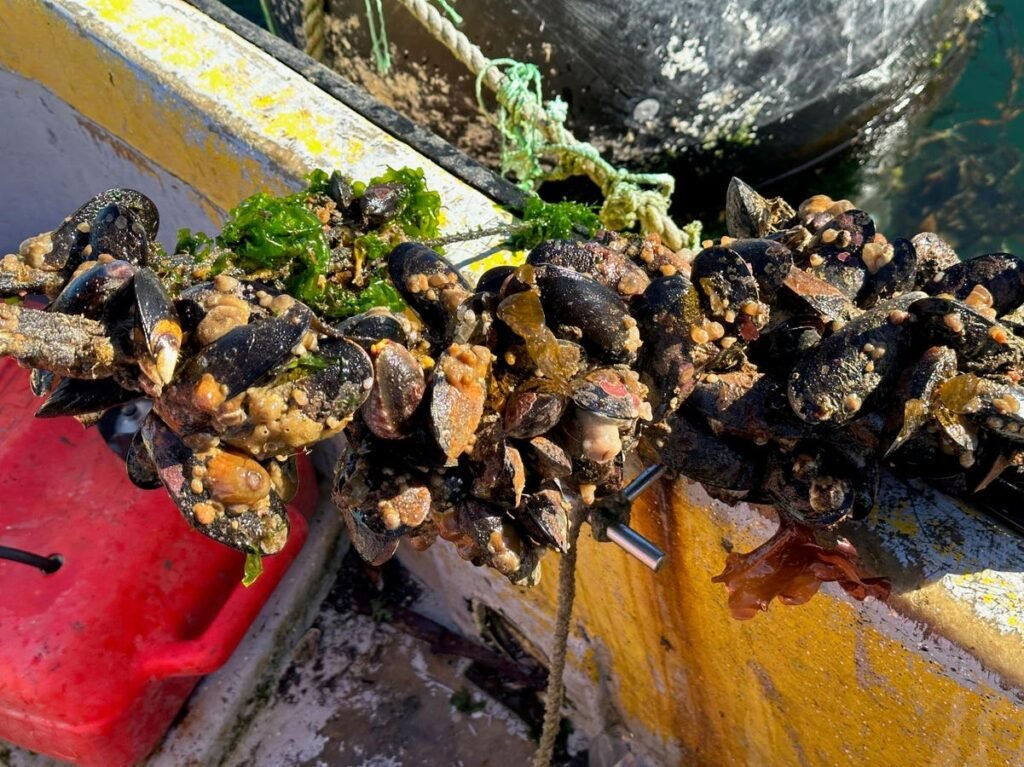Chilean mussel, Mytilus chilensis
Scientists in Chile put Chilean clams (Mytilus chilensis) in simulated Antarctic waters to see if they might someday move south from Patagonia.
Chilean mussels they are native to the cold waters of Patagonia and are economically important in aquaculture for domestic and international consumption. But in a warming world, scientists have expressed concern that these bivalves could settle in nearby Antarctica.
In a study published in April 2024 in the international journal Science of the Total Environment, The researchers showed how, for 80 days, they exposed the mussels to four temperature conditions: the temperature at which they were harvested; Antarctic summer conditions? Antarctic winter conditions. and a final temperature to simulate expected warming in Antarctica.
Jorge Navarro Azocarmarine biologist at IDEAL Research Center and the Universidad Austral de Chile says he and his colleagues have found that while mussels can’t actually survive today’s Antarctic winters, future warming scenarios are likely to “increase the chances of species becoming established in Antarctica.”
“Although mussels would not be able to withstand Antarctic winter conditions Antarctic winter conditions (-1.5 °C), end-of-century climate change scenarios (+ 4 °C for the Antarctic Peninsula), would weakened these physiological barriers.’ adding that this would result in higher survival and growth rates, allowing for a “successful invasion” with serious consequences for the biodiversity of some areas.
“Additionally, increased shipping activity in the southern ocean would help disperse this bivalve,” he says.
Chilean researcher Jorge Navarro Azocar
Growing up in Chilean Patagonia
Navarro’s childhood was spent in Puerto Varas, a town in the Patagonia region of Chile, growing up two blocks from Lake Llanquihue.
“I studied at the Germania school in Puerto Varas, with teachers who constantly encouraged my love of nature, which, together with the fact that I lived in a lake area surrounded by volcanoes, forests and rich flora and fauna, created an environment that influenced my scientific career,” he says.
Navarro explains that with this passion for learning about nature, he studied a Bachelor of Science in Zoology at Universidad Austral de Chile, before doing a PhD in biology at Memorial University of Newfoundland in Canada and postdoctoral work at Plymouth Marine Laboratory in the UK. .
He says that in many areas of marine science, there is a very high level of scientific training of researchers in the Global South and the equipment and methodologies used are no different from those used in developed countries.
“Our scientists are at the level needed to tackle global challenges, such as studying the effects of climate change on marine organisms. the effects of climate change on marine organisms, especially considering the advantages of having natural The advantages of having natural laboratories, such as Patagonia and Antarctica,” says Navarro. “I am convinced that scientists in the southern region alone or in collaboration with scientists from other countries provide valuable perspectives to understand and propose possible solutions to the effects of the proposed possible solution to the effects of climate change in this geographical area of our planet” .
The experimental setup for the study of Chilean mussels.
When the Spiny Hands Crab invaded Colombia
Climate change is also believed to be behind the arrival of an invasive crab in Colombian waters.
The Indo-Pacific swimming crab (Charybdis hellerii) has already invaded the west coast of the Atlantic Ocean, and a study in Belize found that it may have displaced several native crustacean species from shallow-water habitats.
Alejandro Lozano, a marine biology graduate of Universidad Jorge Tadeo Lozano with a master’s degree in Marine Sciences from Universidad Nacional de Colombia, says the crab was likely introduced to Colombia’s Caribbean coast by commercial ships, possibly from another invasive population in the Mediterranean. .
Lozano explains that this crab has been widely reported in Colombia: from the upper Guajira to the Gulf of Moroquijo, and in a 2023 study, researchers showed that some of the areas the crabs reached were more suitable for them than others.
“The idea for this article arose because of the limited attention this crab has received in Colombia and the potential impact it could have on the country, as evidenced in other parts of Latin America such as Venezuela and Brazil, where it has directly affected ecosystems and fisheries,” he says.
